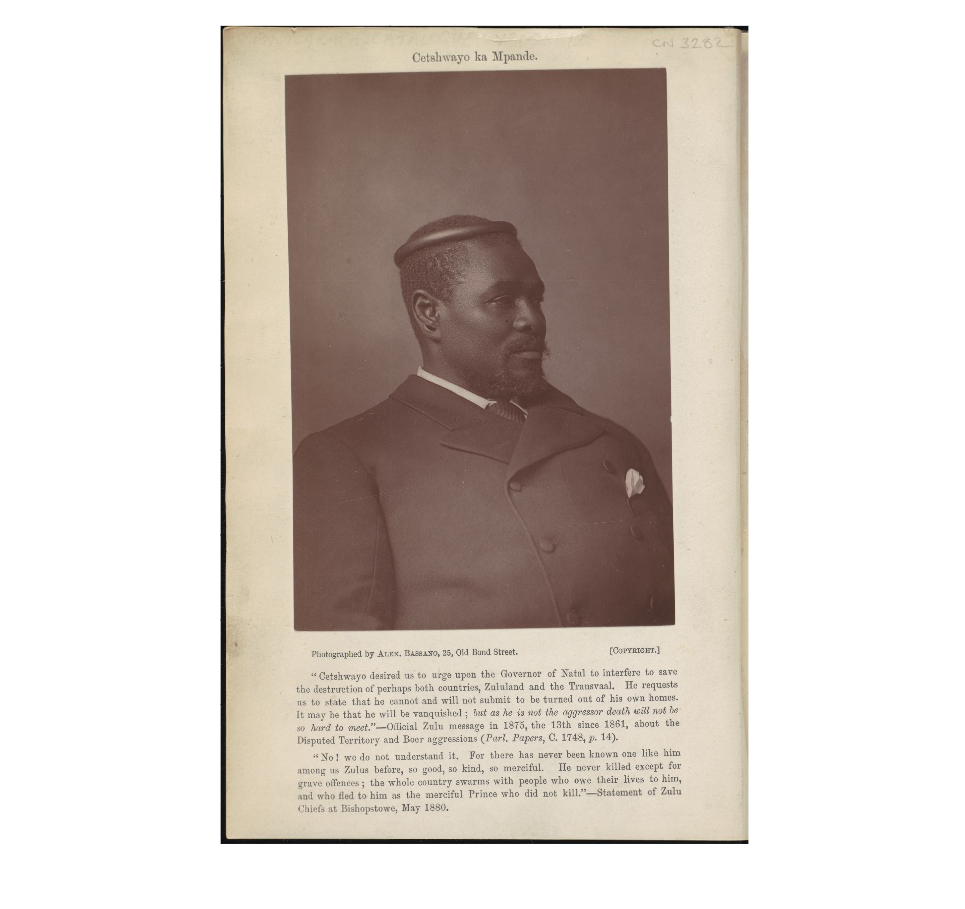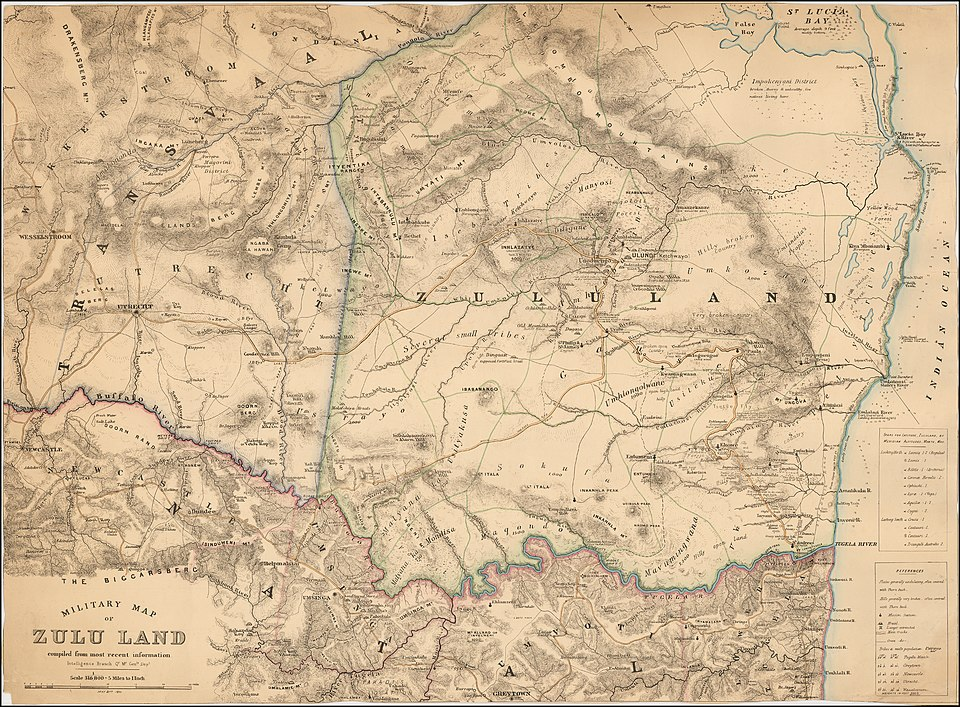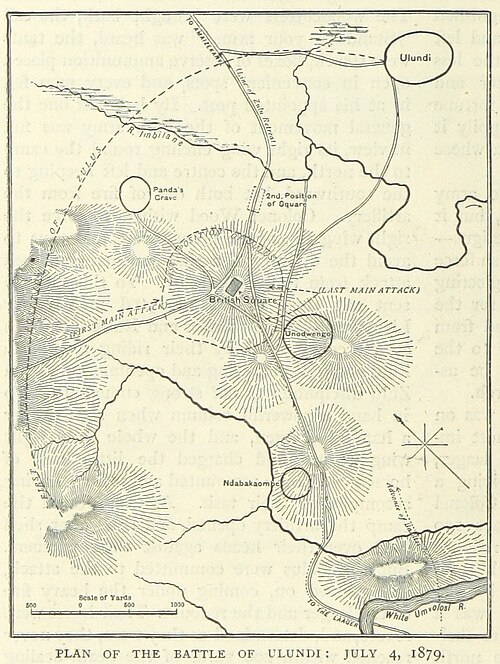IB Syllabus focus:
'Analyze the role of Cetshwayo and the events leading to the conquest and destruction of the Zulu kingdom, including British intervention.'
The confrontation between the British Empire and the Zulu Kingdom under King Cetshwayo kaMpande remains a significant chapter in the history of European imperialism in Africa. The eventual conquest of the Zulus after a dramatic and bloody conflict marked a pivotal moment in the colonial subjugation of the region.
Background of the Zulu Kingdom
Emergence as a major force in southern Africa under King Shaka Zulu in the early 19th century.
Zulu society was highly centralised, militarised, and expansive, with an efficient regiment system known as the "impi."
Shaka’s successors, including Cetshwayo, maintained the kingdom’s military prowess and political structure.
Ascension of Cetshwayo
Cetshwayo kaMpande came to power in 1872 amidst internal strife and power struggles.

Head-and-shoulders portrait of King Cetshwayo by Alexander Bassano (London, 1882), taken during his post-war visit to Britain. The image underscores his status as sovereign and diplomat, complementing the note’s emphasis on his efforts to preserve Zulu independence. . Source
He was recognised for restoring the strength and discipline of the Zulu military.
Cetshwayo sought to preserve Zulu independence amidst increasing European encroachment.
Prelude to Conflict
British Imperial Ambitions
The British Empire’s expansion in southern Africa was driven by the desire for resources and strategic dominance.
British policy aimed to create a confederation of southern African states under British control, with independent kingdoms like the Zulu seen as impediments.
Annexation of the Transvaal
The British annexation of the Boer Republic of Transvaal brought British territory worryingly close to Zulu lands.

An 1879 British Army “Military Map of Zulu Land” showing the Natal–Zululand frontier, key rivers and posts, and the theatre in which the January–July 1879 campaign unfolded. Use this to locate Rorke’s Drift, Isandlwana, and the route to Ulundi referenced in the text. As a contemporary military map, it includes more place-names than required by the syllabus. Source
Cetshwayo’s diplomatic efforts to negotiate over disputed territories were rebuffed by the British.
Ultimatum and Zulu Response
In 1878, the British, under Sir Bartle Frere, delivered an ultimatum with demands designed to be unacceptable to the Zulu.
Cetshwayo’s response, seeking to avoid conflict, was rejected, providing the casus belli for British military action.
The Anglo-Zulu War
Outbreak of War
The British Empire initiated the Anglo-Zulu War in January 1879 without official sanction from the British government.
Cetshwayo’s strategy was initially defensive, hoping to demonstrate Zulu power without engaging in a full-scale war.
Isandlwana and Rorke's Drift
A massive Zulu force defeated British troops at the Battle of Isandlwana in January 1879, challenging Victorian-era assumptions about European military superiority.
The subsequent defence of Rorke’s Drift by a vastly outnumbered British force became a symbol of imperial courage and tenacity.
The Role of Cetshwayo
Cetshwayo’s command at Isandlwana showed his adeptness at traditional warfare, but he failed to exploit the victory fully.
The inability to pursue the British vigorously after Isandlwana was a strategic shortcoming that the British later capitalised on.
Fall of Ulundi
After a series of battles and sieges, the British, now under the command of Sir Garnet Wolseley, invaded and destroyed the Zulu capital, Ulundi, on 4 July 1879.

Contemporary map of the Battle of Ulundi, 4 July 1879, indicating the British hollow-square formation, Zulu approach routes, and the royal kraal (oNdini). It illustrates how concentrated firepower and formation discipline broke the main Zulu army, enabling the burning of Ulundi. Source
The capture of Cetshwayo in August marked the end of the Zulu Kingdom’s independence and the conclusion of the war.
Aftermath of Conquest
British Administration
The British dismantled the Zulu social structure and partitioned the kingdom to prevent future unified resistance.
This fragmentation fostered internal conflict and weakened Zulu resistance to further British incursions and settler exploitation.
The Fate of Cetshwayo
Cetshwayo's exile and eventual return under British terms failed to re-establish his authority or the kingdom’s autonomy.
His legacy endures as a symbol of resistance to colonial expansion.
British Intervention
Political and Economic Motives
The British perceived a unified Zulu state under a strong ruler like Cetshwayo as a threat to their interests in southern Africa.
The economic potential of Zululand, though not as rich as other regions, was nonetheless attractive to British colonial interests.
Military Innovation and Tactics
The British military utilised advanced weaponry, including rifles and artillery, giving them a significant advantage over Zulu spears and shields.
The use of the telegraph and railways allowed for faster coordination and reinforcement, which were crucial after the initial setbacks.
International and Domestic Context
The British incursion into Zululand occurred against the backdrop of the ‘Scramble for Africa,’ wherein European powers competed for African territories.
Despite mixed reactions from the British public, the Zulu War was later used to bolster imperial pride and justify colonial policies.
Analysis of Cetshwayo's Role
Cetshwayo's leadership reflected a mix of traditionalism and a tentative embrace of new military technologies.
His reign was marked by both diplomatic efforts to avoid war and a robust defence of Zulu sovereignty.
Although a capable leader, Cetshwayo's conservative military tactics were ultimately outmatched by the British.
Impact on Indigenous Populations
The defeat and subjugation of the Zulus led to the loss of life, disruption of society, and a severe psychological blow to the people.
The British policies following the war exacerbated divisions and laid the foundations for further racial segregation.
By examining Cetshwayo’s rule and the calamitous events that led to the fall of the Zulu Kingdom, students can grasp the complexities of African resistance in the face of European imperialism. The Zulu’s valiant but ultimately tragic confrontation with British colonial forces remains a testament to their strength and resilience, as well as a sombre reminder of the human cost of colonial conquest.
FAQ
Despite its comparative lack of mineral wealth, the Zulu Kingdom was perceived as a strategic threat because of its significant military capability and its role as a regional power that could challenge British influence in southern Africa. The British were pursuing a policy of consolidation in the region, aiming to bring various territories under their control for easier administration and to create a buffer zone against other colonial powers. The Zulu Kingdom, under a strong and independent leader like Cetshwayo, represented a formidable obstacle to these plans due to its ability to potentially inspire and support resistance against European colonialism in surrounding areas.
Internal Zulu politics were marked by factionalism and a power struggle that Cetshwayo had to navigate upon his ascension to the throne. His consolidation of power was necessary to present a united front against external threats. However, the internal dissent meant that not all of Cetshwayo’s potential resources were united against the British, weakening the kingdom's overall strategic position. The power struggle distracted from the growing threat posed by British colonial encroachment and led to a delay in modernising the military and administrative structures of the Zulu state, which might have otherwise improved their resistance capabilities.
The long-term impacts of the Anglo-Zulu War on southern Africa were profound and multi-faceted. Politically, the defeat of the Zulu Kingdom marked a decisive step in the consolidation of British colonial control over the region, leading to the formation of the Union of South Africa in 1910. This increased British dominance further marginalised indigenous populations and entrenched racial hierarchies. Socially and culturally, the war and subsequent dismantling of the Zulu power structure led to the fragmentation of Zulu society and the erosion of traditional ways of life. The demoralisation and disempowerment of the Zulu people had lasting effects, contributing to the socio-political dynamics that would eventually lead to the apartheid system in the 20th century.
The Zulu military system, centred around the "impi" and the "horn formation" tactics, was initially successful against British forces due to its discipline, mobility, and the shock effect of massed warriors. These factors contributed to the stunning victory at Isandlwana. However, the same system's limitations became apparent as the war progressed. The lack of technological advancement in weaponry and the traditional tactics of direct engagement became liabilities against the superior firepower and tactical flexibility of British forces. The Zulus' adherence to their military traditions, while a source of strength, ultimately contributed to their downfall in the face of a modern, well-equipped adversary.
Cetshwayo's diplomatic efforts were indicative of a leader who was both pragmatic and committed to the sovereignty of his nation. He engaged in negotiations with the British over border disputes and attempted to avoid war through dialogue, demonstrating a nuanced understanding of the political landscape of the time. Cetshwayo’s approach was characterised by a balancing act between maintaining the traditional power structures and autonomy of the Zulu Kingdom and the pressures exerted by European imperial ambitions. His diplomacy showed a willingness to adapt and respond to external challenges while fundamentally seeking to preserve the independence and customs of his people.
Practice Questions
Cetshwayo's military strategies, rooted in traditional Zulu warfare, initially proved effective at Isandlwana, showcasing the potency of the impi formations against a complacent British force. However, the limited adoption of modern weaponry and the failure to capitalise on early victories limited their effectiveness in a protracted conflict. Despite his acumen, Cetshwayo's strategic conservatism was outmatched by British military innovations and logistics, leading to the eventual fall of the Zulu Kingdom. The initial successes under his command were overshadowed by the inability to sustain a long-term campaign against a technologically superior adversary.
The British were driven to conquer the Zulu Kingdom to eliminate a powerful regional state that posed a challenge to their vision of a southern African confederation. Under Cetshwayo, the Zulu Kingdom's military strength and independent diplomacy threatened British hegemony and posed a potential rallying point for anti-colonial resistance. Economic interests, although not as pronounced as in other regions, also played a role, with the British seeking control over any territory that could yield resources. Moreover, the Zulu Kingdom's resilience under Cetshwayo highlighted the imperative for the British to assert dominance, ensuring unimpeded colonial expansion in the face of the broader 'Scramble for Africa'.

